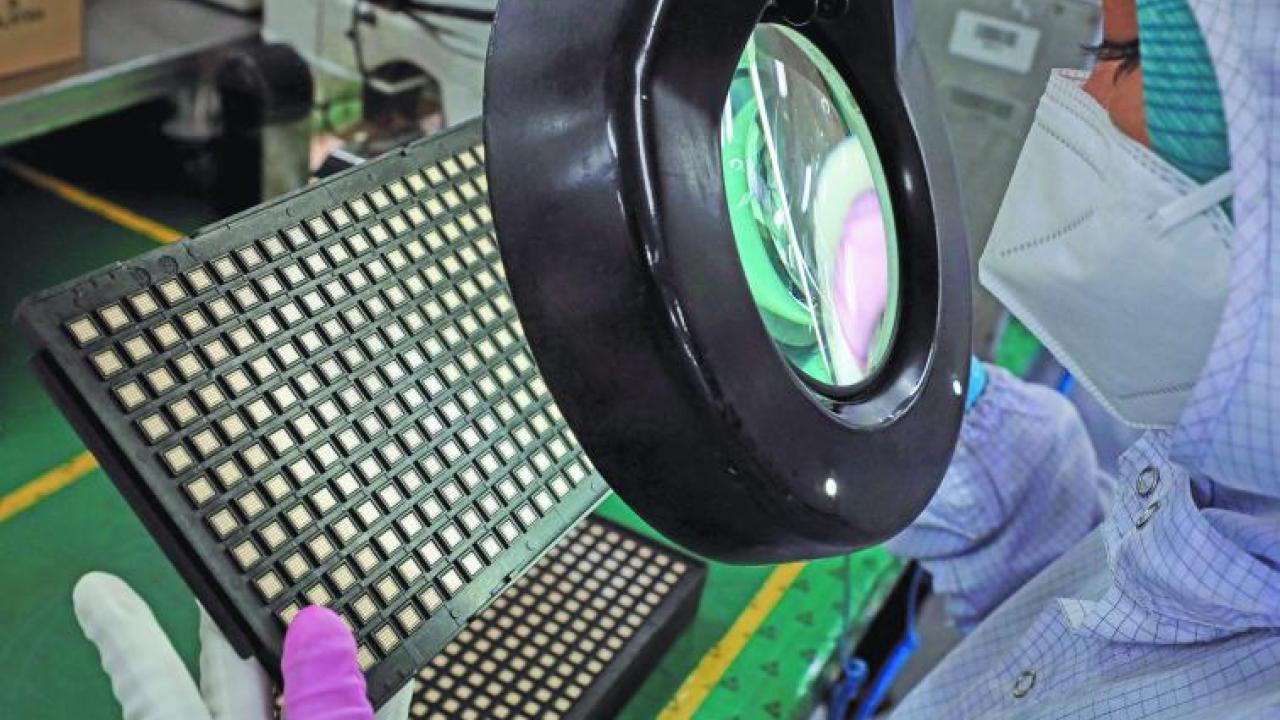
The intention of the agencies is to close the gap with the United States in terms of support; according to the Undersecretary of Foreign Trade, Luis Rosendo Gutiérrez, there is interest from investors from both countries in promoting the semiconductor industry in Mexico.
Several investors from the United States and Mexico have shown interest in promoting a boom in the semiconductor industry in the Aztec country, reported Luis Rosendo Gutiérrez, Undersecretary of Foreign Trade of the Ministry of Economy of the government of Claudia Sheinbaum.
“I was at a semiconductor forum in Ciudad Juarez and there is a huge appetite from American and Mexican investors to make a chip boom in Mexico,” he said.
The forum was held last Wednesday with the aim of presenting a plan for the semiconductor industry, which was developed jointly by the United States Embassy in Mexico and the National Chamber of the Electronics, Telecommunications and Information Technology Industry (Canieti).
Interviewed by local media El Economista , Eugenio Marín, executive director of the United States-Mexico Foundation for Science (FUMEC), specified that the areas of opportunity for investment in Mexico are in Design, Assembly, Packaging and Validation (ATP), in the supply of inputs and components for these productions and in the supply of inputs required by the wafer factories installed in the United States.
"We are currently designing with the Ministry of Finance an incentive program very similar to what was done in the United States with the Inflation Act and the CHIPS Act to support the semiconductor chip industry in our country and support these high-tech industries," added Gutiérrez, while participating in the XXX Mexican Foreign Trade Congress, organized by the Mexican Council for Foreign Trade, Investment and Technology (Comce).
As part of the CHIPS and Science Act, enacted in August 2022, the Department of Commerce is responsible for administering $38.22 billion in direct funding for semiconductor manufacturing incentives, including $500 million for seven countries outside the United States, including Mexico.
A portion of these funds (up to $6 billion) will be used to subsidize direct loans or loan guarantees totaling up to $75 billion.
The U.S. Department of Commerce expects the total amount of incentives awarded for a project (including grants, loans, and loan guarantees) to represent less than 35% of total capital expenditures.
While direct grants must represent between 5 and 15 percent of total project costs, individual projects cannot receive more than $3 billion in federal investment without Presidential certification to Congress.
Additionally, Section 107 of the CHIPS Act creates a new tax credit, the Advanced Manufacturing Investment Credit (AMIC), which will be administered by the Internal Revenue Service.
The AMIC is equal to 25% of the value of qualified investments in buildings and other eligible depreciable tangible property for advanced manufacturing facilities that have as their principal purpose the manufacture of semiconductors or semiconductor manufacturing equipment.
Marín said that Mexico needs to analyze how to provide specific incentives to the semiconductor sector, considering the formats, competition with direct competitor countries and the size of the investments.
“In these niches, investments are not in the billions of dollars, they are much smaller, and that is what needs to be studied carefully to find the balance with respect to the nations with which Mexico competes,” he said.
The Inflation Reduction Act, also from 2022, allocates some US$380 billion to tax incentives and other support related to clean energy and climate change. It includes incentives for the production of diodes, transistors and similar semiconductor devices; photosensitive semiconductor devices; and light-emitting diodes.
It is urgent to balance the economy
In its 2024-2030 Work Plan, presented a few days ago, the Ministry of Economy diagnosed the urgency for Mexico to increase incentives to attract more investments in sectors such as advanced manufacturing.
“The Ministry of Economy is working on the 2025 Investment Portfolio to create a pipeline (structured process) for monitoring and landing investments in our country,” states a presentation of the Work Plan.
To do so, he adds, coordination with various ministries will be necessary. “It is urgent to reduce the disadvantage represented by the Inflation Reduction Act by the United States and the Stimulus Package Implemented by Canada,” he urges.
Mexico grants key export sectors an immediate deduction for new fixed assets acquired from October 12, 2023, through December 31, 2024, with deduction percentages ranging from 56% to 89%, and an additional 25% deduction for three years for job training expenses.
INCENTIVES GRANTED BY THE U.S. TO THE CHIP INDUSTRY
- The CHIPS and Science Act allocated more than $50 billion to the Department of Commerce's CHIPS for America program for both R&D and expanding semiconductor manufacturing capacity in the United States.
- As part of the CHIPS and Science Act grants, the Department of Commerce is responsible for administering the $38.22 billion in direct funding available for semiconductor manufacturing incentives.
- The CHIPS Act of 2022 created the ITSI Fund, which provides the Department of State with $500 million ($100 million per year for five years, beginning in fiscal year 2023).
- The ITSI Fund seeks to ensure semiconductor security and supply chain diversification through new programs and initiatives with seven U.S. partner countries, including Mexico.
- A portion of the CHIPS Act funds (up to $6 billion) will be used to subsidize direct loans or loan guarantees totaling up to $75 billion.
- The Inflation Reduction Act of 2022 allocates about $380 billion for tax incentives and other support related to clean energy and climate change.









